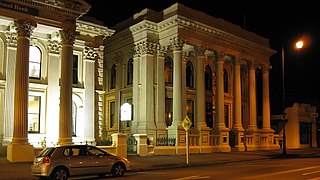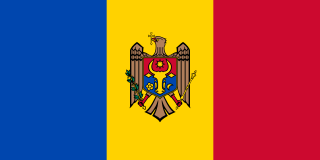
A non-disclosure agreement (NDA), also known as a confidentiality agreement (CA), confidential disclosure agreement (CDA), proprietary information agreement (PIA), or secrecy agreement (SA), is a legal contract or part of a contract between at least two parties that outlines confidential material, knowledge, or information that the parties wish to share with one another for certain purposes, but wish to restrict access to. Doctor–patient confidentiality, attorney–client privilege, priest–penitent privilege and bank–client confidentiality agreements are examples of NDAs, which are often not enshrined in a written contract between the parties.
A shareholder of corporate stock refers to an individual or legal entity that is registered by the corporation as the legal owner of shares of the share capital of a public or private corporation. Shareholders may be referred to as members of a corporation. A person or legal entity becomes a shareholder in a corporation when their name and other details are entered in the corporation's register of shareholders or members, and unless required by law the corporation is not required or permitted to enquire as to the beneficial ownership of the shares. A corporation generally cannot own shares of itself.
Corporate transparency describes the extent to which a corporation's actions are observable by outsiders. This is a consequence of regulation, local norms, and the set of information, privacy, and business policies concerning corporate decision-making and operations openness to employees, stakeholders, shareholders and the general public. From the perspective of outsiders, transparency can be defined simply as the perceived quality of intentionally shared information from the corporation.
In domestic and international commercial law, a beneficial owner is a natural person or persons who ultimately owns or controls an interest in a legal entity or arrangement, such as a company, a trust, or a foundation. Legal owners, commonly described as the "registered owners", may hold those interests as beneficial owners or for the benefit of someone else, in which case they may be described as a "nominee".
The mass media in Georgia refers to mass media outlets based in the Republic of Georgia. Television, magazines, and newspapers are all operated by both state-owned and for-profit corporations which depend on advertising, subscription, and other sales-related revenues. The Constitution of Georgia guarantees freedom of speech. Georgia is the only country in its immediate neighborhood where the press is not deemed unfree. As a country in transition, the Georgian media system is under transformation.
The mass media in Bulgaria refers to mass media outlets based in Bulgaria. Television, magazines, and newspapers are all operated by both state-owned and for-profit corporations which depend on advertising, subscription, and other sales-related revenues. The Constitution of Bulgaria guarantees freedom of speech. As a country in transition, Bulgaria's media system is under transformation.
The mass media in Cyprus refers to mass media outlets based on the island of Cyprus, including both the Republic of Cyprus (RoC) and the Turkish Republic of Northern Cyprus (TRNC). Television, magazines, and newspapers are all operated by both state-owned and for-profit corporations which depend on advertising, subscription, and other sales-related revenues.
The mass media in North Macedonia refers to mass media outlets based in North Macedonia. Television, magazines, and newspapers are all operated by both state-owned and for-profit corporations which depend on advertising, subscription, and other sales-related revenues. The Constitution of North Macedonia guarantees freedom of the press and of expression, yet they are not upheld impartially by the authorities. As a country in transition, North Macedonia's media system is under transformation.

The mass media in Moldova refers to mass media outlets based in the Republic of Moldova. Television, magazines, and newspapers are all operated by both state-owned and for-profit corporations which depend on advertising, subscription, and other sales-related revenues. The Constitution of Moldova guarantees freedom of speech. As a country in transition, Moldova's media system is under transformation.
The mass media in Montenegro refers to mass media outlets based in Montenegro. Television, magazines, and newspapers are all operated by both state-owned and for-profit corporations which depend on advertising, subscription, and other sales-related revenues. The Constitution of Montenegro guarantees freedom of speech. As a country in transition, Montenegro's media system is under transformation.
Regulation S-K is a prescribed regulation under the US Securities Act of 1933 that lays out reporting requirements for various SEC filings used by public companies. Companies are also often called issuers, filers or registrants.

The mass media in Kosovo consists of different kinds of communicative media such as radio, television, newspapers, and internet web sites. Most of the media survive from advertising and subscriptions.

Transparency of media ownership refers to the public availability of accurate, comprehensive and up-to-date information about media ownership structures. A legal regime guaranteeing transparency of media ownership makes possible for the public as well as for media authorities to find out who effectively owns, controls and influences the media as well as media influence on political parties or state bodies.
Transparency of media ownership refers to the public availability of accurate, comprehensive and up-to-date information about media ownership structures to make possible for media authority and the wider public to ascertain who effectively owns and controls the media. Between 2011 and 2012, following some concerns on opaque activities which accompanied the process of privatisation of the media in Croatia, the government initiated the reform of the law on transparency of media ownership with the aim to avoid the concealment of information on media ownership structure.
Transparency of media ownership refers to the public availability of accurate, comprehensive and up-to-date information about media ownership structures, to make it possible for media authorities and the wider public to ascertain who effectively owns and controls the media. In Romania, transparency of media ownership is addressed directly in the Constitution and is regulated by a media-specific law, namely the Audiovisual Law no. 504, and by national company law. As for constitutional provisions, even if Romania is among the few European countries that addresses the issue of media transparency directly in the Constitution, the focus is on transparency of financial sources and not on ownership. Nonetheless, despite the constitutional provisions on the right to impose an obligation on the media to make public their sources of finance, the Parliament has never enacted the applicable legislation. The Romanian media-specific law requiring the disclosure of media ownership information applies only to the broadcast sector and provides the disclosure to both a public authority, namely the National Audiovisual Council (CNA) and directly to the public. Finally, the national company law contains provisions regulating transparency of media ownership. It applies to all media which are registered companies and foresees the obligation to publish all the most relevant information on companies' ownership in the Trade Register Company. Overall, even though the Romanian legislation in the field of media ownership transparency is fully aligned with the European standards, in practice sufficient information to assess who effectively owns and ultimately controls the media is not always available.
Access to public information and freedom of information (FOI) refer to the right to access information held by public bodies also known as "right to know". Access to public information is considered of fundamental importance for the effective functioning of democratic systems, as it enhances governments' and public officials' accountability, boosting people participation and allowing their informed participation into public life. The fundamental premise of the right to access public information is that the information held by governmental institutions is in principle public and may be concealed only on the basis of legitimate reasons which should be detailed in the law.
Access to public information and freedom of information (FOI) refer to the right to access information held by public bodies also known as "right to know". Access to public information is considered of fundamental importance for the effective functioning of democratic systems, as it enhances governments' and public officials' accountability, boosting people participation and allowing their informed participation into public life. The fundamental premise of the right to access public information is that the information held by governmental institutions is in principle public and may be concealed only on the basis of legitimate reasons which should be detailed in the law.
Access to public information and freedom of information (FOI) refer to the right of access to information held by public bodies also known as "right to know". Access to public information is considered of fundamental importance for the effective functioning of democratic systems, as it enhances governments' and public officials' accountability, boosting people participation and allowing their informed participation into public life. The fundamental premise of the right of access to public information is that the information held by governmental institutions is in principle public and may be concealed only on the basis of legitimate reasons which should be detailed in the law.
Access to public information and freedom of information (FOI) refer to the right of access to information held by public bodies also known as "right to know". Access to public information is considered of fundamental importance for the effective functioning of democratic systems, as it enhances governments' and public officials' accountability, boosting people participation and allowing their informed participation into public life. The fundamental premise of the right of access to public information is that the information held by governmental institutions is in principle public and may be concealed only on the basis of legitimate reasons which should be detailed in the law.
Transparency of media ownership is the public availability of accurate, comprehensive and up-to-date information about media ownership structures. A legal regime guaranteeing transparency of media ownership makes possible for the public as well as for media authorities to find out who effectively owns, controls and influences the media as well as media influence on political parties or state bodies. The disclosure of media ownership can be prescribed by generic regulation or by media-specific provision. Such measures may mandate the disclosure of information on media ownership structures to specific authorities or to the general public.



